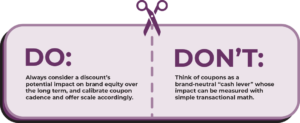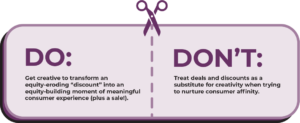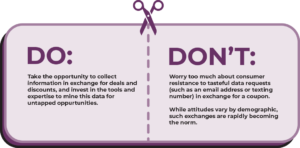The Dos and Don’ts of Couponing in 2022

According to US News & World Report, skyrocketing inflation has more than eight out of 10 Americans worried about holiday shopping expenses this year, with more than half planning to spend less on holiday gifts compared with prior years.
Many retailers are planning how to win their share of a dwindling consumer wallet this holiday season, and coupons are definitely part of their strategy. With the majority of consumers asserting they plan to use coupons to help offset holiday costs, discounts can clearly play a role in brand recession-readiness. But at Wilks Communications Group, we advise clients to wield these tools with care.
Depending on the nature of your brand, your consumer and your goals, there is a right and wrong way to offer deals and discounts. Done poorly, couponing can degrade your brand equity and train consumers into a race-to-the-bottom price spiral. Done well, a coupon program can yield not only a desired bump in sales, but also — and this is key — other long-term brand benefits including increased loyalty. Below, we offer a few guidelines to help you hit the sweet spot this season.
First things first: is couponing a fit for your brand?
The answer to this question is “yes” for most businesses — but nuance matters. As a general rule, the more often and more deeply you discount, the less consumers will attribute premium characteristics to your brand. This isn’t necessarily a bad thing if an “everyday” or “value” position matches your business model, pricing strategy and target audience mindset. Certainly, generous holiday couponing makes sense for brands in this category.
However, if your brand aspires to a more premium position, take extra care to frame holiday couponing as a rare, select opportunity while preserving an overall brand aesthetic of elevated status and quality. And if you seek — or have already achieved — super-premium luxury brand status, discount coupons may do more harm than good in the long term. For this type of brand, we recommend alternative tactics such as a concierge-level customer service, product personalization, or tasteful product bundling to raise perceived value even higher and attract full-price holiday sales.

Provide an experience — not just a discount.
While couponing originated as a straightforward sales-boosting tactic, today’s most effective brands have learned to weave coupons into an experiential brand communication strategy to build awareness, loyalty and advocacy while also supporting sales.
The personalization quiz with which we’re all familiar is a perfect example. A well-produced, creative find-your-product quiz allows a brand to begin a conversation with the consumer, establishing a baseline level of emotional and intellectual engagement right off the bat. Delivering a coupon at the end — with messaging that highlights the custom nature of the offer – seals the deal with a satisfying impression of personal care. Every element of this journey helps the consumer feel valued and unique; a brand-relationship win with potential benefits that extend far beyond the immediate transaction.
Quizzes are just one of many ways to frame discounts within a larger, more meaningful experience. Loyalty rewards, refer-a-friend deals and sampling programs can also fall into this category when well executed, along with countless other possibilities. The point is to use creative communication to draw consumer attention toward the compelling benefits of your products and brand, rather than making the discount the primary message.

Remember that a coupon is a value exchange.
For ecommerce shoppers, coupons are quickly making the transition from a perk to a requirement. According to recent data from Capterra, nearly all online shoppers (91%) sometimes use coupons, and a full 71% use them “whenever possible.” Even more importantly, 78% of online shoppers have decided against a purchase because a coupon wasn’t available.
Fortunately for businesses, these aggressive coupon expectations are just one side of the ever-more fluid two-way conversation between brands and consumers; shoppers expect to receive, but they’re ready to give as well. About half of shoppers studied in the Capterra survey are willing to provide data such as name, email address, birthdate and gender in exchange for a deal, making coupons an extremely effective tool for enhancing your consumer information database and gleaning insights.

At Wilks Communications group, we specialize in helping clients generate creative, innovative marketing ideas that build brand equity while also driving sales. If you’d like to learn more about our approach, let’s start a conversation.